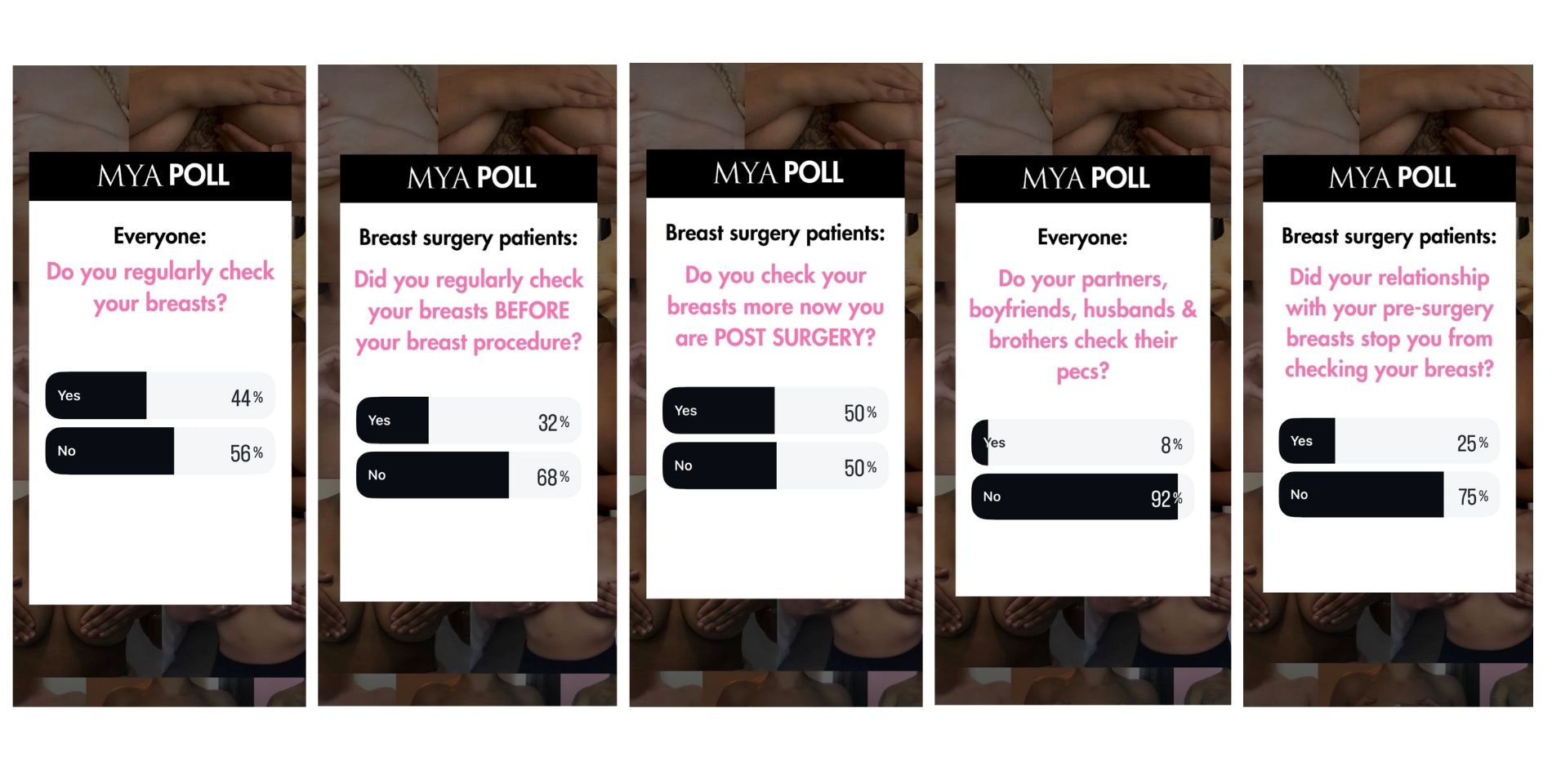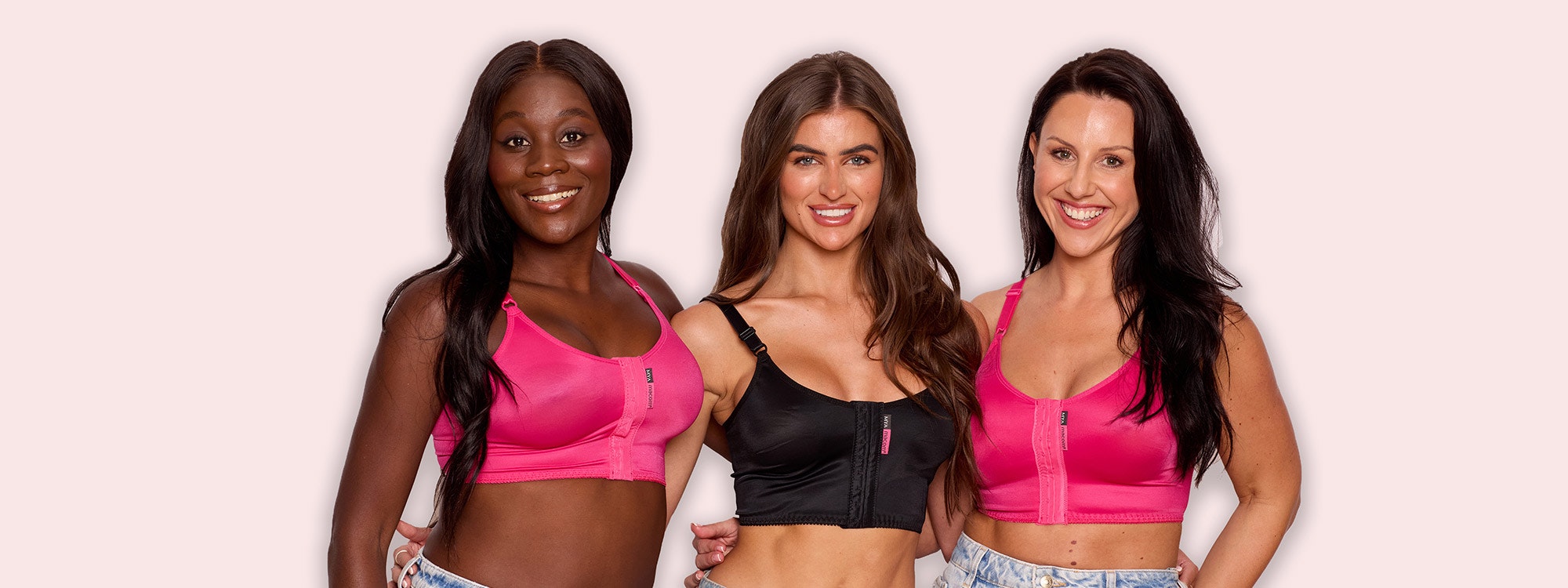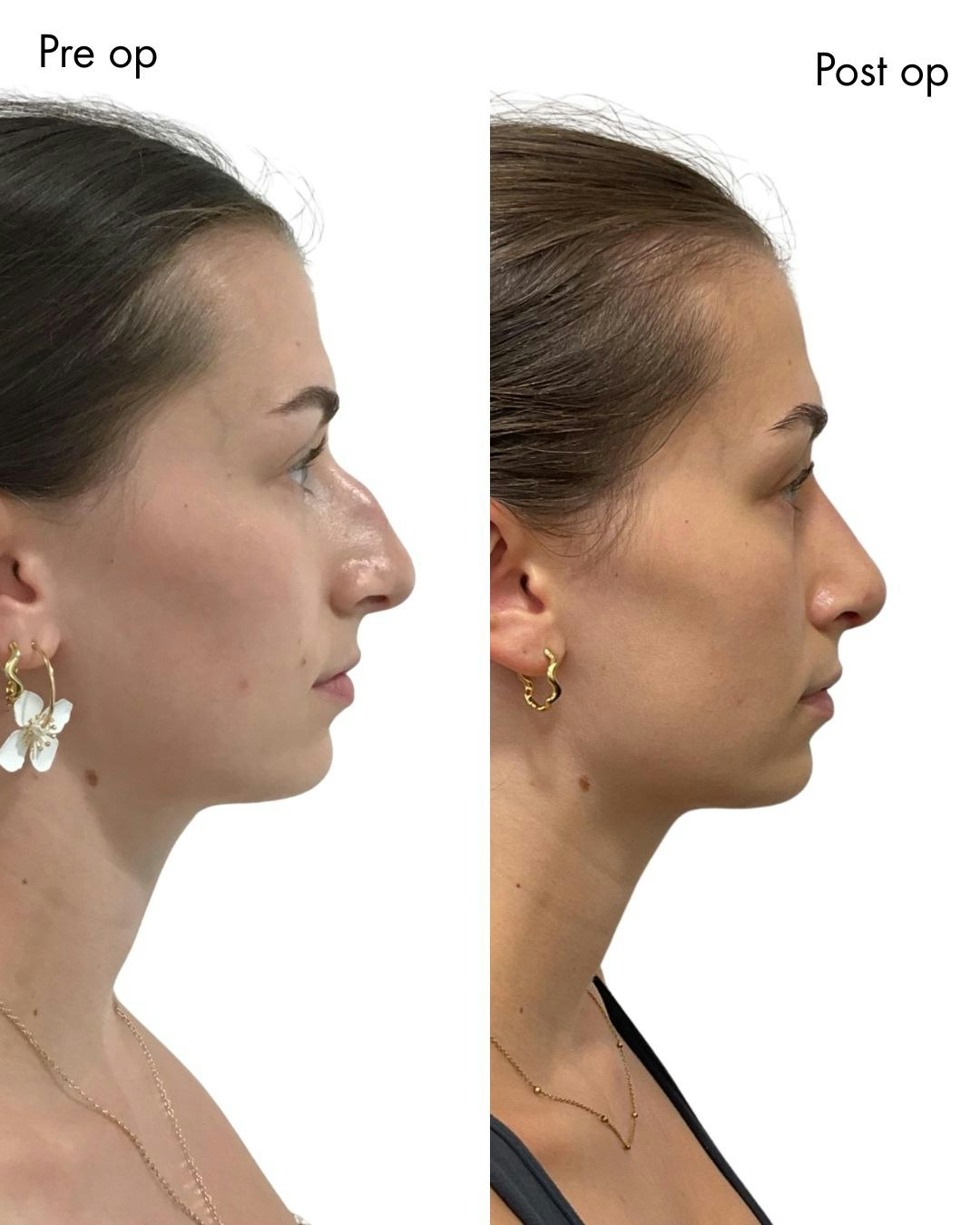Supporting Breast Cancer Awareness Month
We want our MYA community to understand the importance of breast health and cancer awareness, and how having a healthy relationship with your breasts and having a feel of them regularly could save your life!
In the UK, 1 in 7 women will be affected by breast cancer in their lifetime. By raising awareness, we want to help educate our patients and followers about the signs and symptoms and what to look out for when checking your breasts.
By donating to breast cancer research charities, we can help raise money to not only educate the UK, but also to make treatment more accessible and ultimately find a cure.
⏰❤️Look out for our monthly breast check reminders on social media ⏰❤️
MYA Check Your Breast Poll
We carried out a poll on Instagram to see how many MYA patients and followers carry out regular breast checks and to see whether there was a correlation in women who have an unhealthy relationship with their bodies and their likelihood to check their breasts.
The results are displayed below:
 Our Key Findings:
Our Key Findings:
More than half of the people (56%) said they do NOT check their breasts regularly.
Asking those who’d had breast surgery, we found that:
Whereas 49% of people check regularly following breast surgery
Only 8% of men check their pecks
92% of males do NOT check their pecs (male breast tissue)
Our Conclusion:
From our MYA Poll we can see that still a large proportion of people are still not checking their breasts! 1 in 4 people (26%) also said that their relationship with their breasts pre-surgery stopped them from checking their breasts.
At MYA we believe that if you are less confident about your breasts you are less likely to check them! It is so important that you are familiar with your breasts so you know what is normal and not normal for you.
Learning what’s normal for you
All boobs are different and will naturally change throughout our lifetime. They can look different each month during the monthly cycle, but can also change due to other hormonal changes (such as menopause, pregnancy, and breastfeeding) and weight fluctuations.
Understanding how your breasts feel and change throughout your menstrual cycle will help build confidence in knowing what's ‘normal' for you. By checking your breasts regularly each month, you are then more likely to notice any changes that occur.
If you undergo breast surgery - of any kind - it's important you get to know your new normal. Have a feel once they're healed and get to grips with what they look and feel like.
So whether you have natural breasts or implants, having a healthy relationship with your breasts and not being afraid to have a good feel and look at them in the mirror is key - early detection of breast cancer could save your life!
Breast cancer in men
While breast cancer is more commonly found in women, it's important to note that 1 in 100 men in the UK are diagnosed with breast cancer.
Our MYA Poll results showed that only 8% of men check their breasts (pecs), meaning 92% of men are NOT checking their pecs!
Although the odds are slimmer, it's important we raise awareness to make sure men are checking their breast tissue the same amount as women.
The signs are the same, and so is the examination process.
What are the signs of Breast Cancer?
Breast cancer doesn't just present itself as a lump - there are other signs and symptoms you need to be aware of, too. It's important to remember that symptoms can occur in one or both of your breasts, as well as your armpit and collarbone.
Learning what signs and symptoms to look out for when checking your breasts is so important - we all need to learn to give our breasts some TLC.
Make sure you touch, look, and check!
You are never too young to start checking your breasts – this a great ritual to teach your daughters when they are getting changed or in the shower, so when they get older it becomes second nature and they get used to their version of normal when it comes to their breasts.
How to perform a self-examination on your breasts:
A lot A lot of women say they don't know how to check their breasts, but there really is NO RIGHT OR WRONG WAY to check. There are definitely certain things to look and feel for, but the main goal is to get more women touching their breasts on a regular basis and learning what ‘normal' feels like for them.
To help guide you through this process, our expert MYA Nurse Joanna gives some top tips on how to perform a self-examination on your breasts.
Check your breasts when standing in front of the mirror, lying down, or in the shower.
Run the flats of your fingers over the whole of the breast in circular motions to check for any lumps or thickening tissue.
Use different levels of pressure, but do not press too hard or squeeze your breasts.
Check your whole breast from your collarbone to your ribcage, then check your armpits.
Using your finger and thumb, gently squeeze your nipple to check for any fluid or discharge.
If you notice anything unusual – contact your GP!
How to check breasts with implants:
Patients with breast implants need to understand their new normal, as their breasts may feel different after surgery.
If you have implants, you will still examine yourself in the same way, you just need to differentiate between the implant and scar tissue. Do not examine yourself during the healing period after surgery - wait until you are at least 6 weeks post-op to perform a self-examination.
If you have any concerns about checking your breasts post-op, ask your MYA nurse, who will be able to point you in the right direction and give you tips.
What to do if you find a breast cancer symptom?
It can feel extremely daunting and scary if you think you have found a lump or have noticed an unusual change in one or both of your breasts, but the quicker you act, the better! Seek professional advice and book an appointment to see your GP straight away.
Secondary breast cancer is when the cancer starts in the breast and spreads to other areas of the body. The earlier the cancer is detected, the lower the likelihood of it spreading.
Early detection of breast cancer could save your life!
Breast Cancer FAQs:
Am I too young to get breast cancer?
Breast cancer can affect people of all ages, as breast tissue develops at a young age, so it is important to get into the habit of checking your breasts regularly in your teens.
How often do I need to check my breasts?
It is recommended you check your breasts once a month as your breasts can change throughout your menstrual cycle. There’s no harm in checking more often though!
Do men need to check their pecs?
Yes, men have breast tissue in their chests and under their armpits. Encourage your partner, brother or Dad to be aware of the signs and symptoms and to check their chests too.
Is Breast Cancer hereditary?
Yes, breast cancer can be hereditary but there are also other types of breast cancer that aren’t hereditary. Therefore, all women should be checking their breasts not just those with a family history of breast cancer.
What should I do if I find a lump?
If you find a lump or notice any unusual changes in your breasts or pecs it is important to contact your GP straight away and arrange an appointment. We also advise talking to a friend or family member for support.
Where can I find more information and support services?
For more information on signs and symptoms of breast cancer and breast cancer support visit https://www.nhs.uk/conditions/breast-cancer/, https://coppafeel.org/, https://breastcancernow.org/.
How can I support breast cancer awareness?
-Donate to breast cancer charities and organise fundraising events.
-Recycle and donate your old or unwanted bras to the charity Against Breast Cancer – by dropping your bras off at one of our MYA clinical hubs. Donations assist with the funding of breast cancer research.
-Spread breast awareness amongst your friends and family and set a monthly reminder to check your breasts.
-Follow @coppafeelpeople on Instagram for lots of amazing breast-related content.
At what age will I be invited for an NHS breast screening?
Women in the UK will be invited for NHS breast screening, otherwise known as Mammograms, from the age of 47-50. These will take place every 3 years.
Can I have a mammogram with breast implants?
Yes, you can still have mammograms if you have had breast implants, you just need to notify the practitioner beforehand.
Can patients with breast implants still self-examine their breasts?
Yes, if you have had breast implants you can still check your breasts in the recommended way. You just need to understand your new normal, as your breasts will have changed post-surgery, and be able to differentiate between your implant and breast tissue.
Share your photos of you checking your breasts and hashtag #MYABoobHeroes






 Our Key Findings:
Our Key Findings: 




